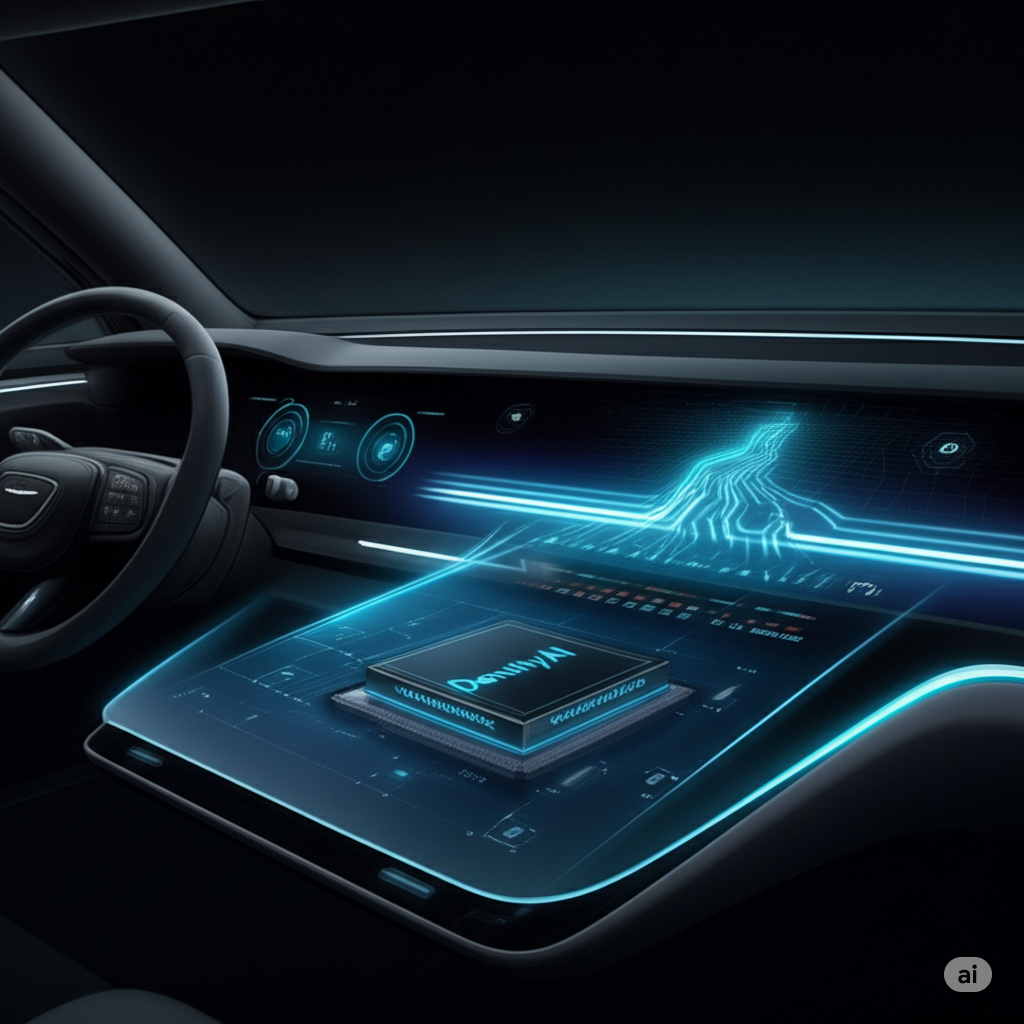Autonomous vehicles aren’t just a vision for tomorrow—they’re a technical challenge for today. Under the hood, every self-driving car must process immense real-time data, fuse sensors, and execute decisions in milliseconds. The backbone of this revolution is AI infrastructure—hardware and software built to handle heavy-duty neural networks, perception, and control.
Enter DensityAI, founded by Ganesh Venkataramanan (former Tesla Dojo supercomputer lead), backed by 20 ex-Tesla engineers. This Bengaluru-based startup is catalyzing a critical industry shift: from automakers struggling to build and scale their own AI compute stacks, to a future where innovation, speed, and safety are realized through plug-and-play, full-stack AI platforms.
Key Highlights
- DensityAI builds specialized, domain-specific AI infrastructure that enables automakers to focus on software innovation, not hardware headaches.
- The startup offers a ready-made, plug-and-play AI compute stack tailored for autonomous vehicles—hardware and software co-designed for real-time performance.
- Powered by former Tesla talent, DensityAI leverages deep expertise in AI workloads, neural network acceleration, and safety-critical compute.
- Outsourcing AI infrastructure de-risks deployment, allowing car companies to scale self-driving technologies quickly and securely.
- The advent of DensityAI marks a paradigm shift toward industry-wide adoption of specialist hardware for safe, scalable autonomous driving.
Keywords List:
DensityAI, autonomous vehicles AI infrastructure, Ganesh Venkataramanan, plug-and-play AI stack, self-driving car platform, real-time data processing, automotive AI hardware, scalable autonomous deployment, AI compute outsourcing, Tesla Dojo alumni, neural network acceleration, specialized AI chip, automotive innovation, AI for automakers, autonomous driving technologies, deep learning automotive, vehicle safety AI, scalable compute, auto-tech disruption, full-stack AI solution, future of mobility
The Evolution: Why AI Compute Is the Bottleneck for Self-Driving Cars
The dream of autonomous vehicles is everywhere—but the reality is grounded in massive computational demand. Cars must:
- Fuse feeds from cameras, radar, lidar, GPS, and IMU sensors.
- Run millions of neural network operations per second for perception, prediction, and planning.
- Guarantee safety and reliability—for passengers, pedestrians, and the road ecosystem.
The Challenge
- Most automakers lack the resources to build bespoke AI hardware at scale.
- Legacy chipsets or generalized server hardware are ill-suited for automotive latency, reliability, and energy constraints.
- Software and hardware optimization demands rare expertise—enter DensityAI’s specialist engineering.
How DensityAI Outsources Complexity—And Speeds Innovation
DensityAI’s unique value is its full-stack approach, integrating:
1. Specialist AI Hardware
- Proprietary chips and boards built for automotive-grade requirements—robust, low-power, and fail-safe.
- Optimized for ultra-fast neural network inference and high-bandwidth sensor fusion.
2. Tailored AI Software
- Real-time operating systems with deep learning frameworks pre-integrated for perception, localization, and control.
- APIs and toolkits designed to let automakers deploy, monitor, and update models with minimal friction.
3. Safety and Security Layer
- Redundant safety systems, secure boot mechanisms, and diagnostics—aligning with ISO 26262 and global automotive safety standards.
4. Plug-and-Play Integration
- The stack is modular and scalable—automakers can slot DensityAI’s platform into existing vehicles or new builds.
- No need to reinvent the compute infrastructure wheel—engineers focus on the vehicle’s unique intelligence and user experience.
Industry Impact: Unlocking Scalable Autonomous Deployment
1. Speed to Market
- Automakers skip years of R&D, leveraging proven, production-ready AI infrastructure.
2. Cost Savings
- Shared specialist hardware reduces per-vehicle cost and ensures better ROI—making autonomy feasible beyond luxury segments.
3. Risk Reduction
- AI safety, performance, and compatibility are pre-validated, cutting deployment risks and regulatory hurdles.
4. Focus on Innovation
- Manufacturers and tech companies can channel resources into advanced algorithms, human-machine interfaces, or next-gen features—not foundational engineering.
5. Ecosystem Growth
- As more automakers adopt DensityAI’s stack, industry standards emerge—driving faster cross-company learning, updates, and upgrades.
The Leadership Behind DensityAI: Tesla Expertise, Global Vision
Ganesh Venkataramanan’s experience leading Tesla’s Dojo supercomputer is pivotal. Dojo pushed boundaries in deep neural network training for self-driving, enabling Tesla to process vast sensor data at scale. DensityAI’s founding team—20 ex-Tesla engineers—bring rare insight into hardware-software co-design, real-world scaling, and safety integration.
By channeling this expertise into a company designed for industry use (not just for one OEM), DensityAI moves autonomous driving closer to reality for traditional and new automakers worldwide.
The Technical Breakthrough: Domain-Specific AI Infrastructure
Unlike traditional GPUs or server chips, DensityAI’s hardware is purpose-built:
- Sensor-to-Decision Pipeline: Managed in under 50ms for real-time response.
- Edge-Aware Compute: Low-latency, power-efficient, auto-grade components made for permanent vehicle operation.
- AI Model Agility: Compatible with evolving deep learning architectures, from transformers to reinforcement learning.
The software stack anticipates regulatory and security needs, with continuous monitoring and validation to ensure autonomy doesn’t mean vulnerability.
The Broader Implications: Industry Transformation and Future Mobility
1. Democratizing Self-Driving Tech
- Smaller automakers, startups, or regional players can now access top-tier autonomy, leveling the playing field against mega-corporations.
2. Enhanced Safety
- Specialist platforms ensure reliable, repeatable safety—supporting global standards for automotive AI validation.
3. Global Reach
- Though India-born, DensityAI’s stack is export-ready, supporting regional requirements and integrability in North America, Europe, and Asia.
4. Flexibility and Upgradability
- Plug-and-play platforms allow software updates, feature additions, and scale-ups without full vehicle recalls—futureproofing factory investments.
Challenges and What Lies Ahead
- Integration: Smooth interfacing across diverse vehicle architectures and sensor arrays requires open standards and robust documentation.
- Regulation: Autonomous driving is heavily regulated; DensityAI must continually align products with evolving safety and privacy frameworks worldwide.
- Market Adoption: OEMs need education and assurance that outsourcing compute is as secure (or better) as in-house R&D.
The company’s approach—collaboration, transparent benchmarking, and aggressive testing—seeks to resolve these obstacles.
Takeaway: Plug-and-Play Autonomy—A Roadmap for the Future
As self-driving cars move from prototype to fleet, the complexity behind success is best handled by those who’ve already built at scale. DensityAI’s specialized infrastructure lets automakers turn their energy to what matters—innovation, experience, and trust. With world-class AI stacks simplifying safe, scalable deployment, the autonomous revolution is no longer hindered by compute limitations.
Self-driving car technology is evolving—no longer stalled by compute complexity. With DensityAI’s specialist platform, innovation, scale, and safety take the driver’s seat.









+ There are no comments
Add yours